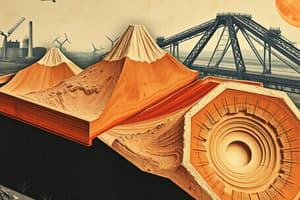Podcast
Questions and Answers
What is geology primarily concerned with?
What is geology primarily concerned with?
- Investigating the behavior of subatomic particles
- Exploring the properties of chemical compounds
- Studying the Earth and other astronomical objects (correct)
- Studying the history of human civilization
What does geochemistry primarily determine?
What does geochemistry primarily determine?
- Absolute ages of rocks (correct)
- Behavior of ocean currents
- Composition of the Earth's atmosphere
- Relative ages of rocks
What does geology provide evidence for?
What does geology provide evidence for?
- Chemical reactions in the Earth's core
- Plate tectonics and Earth's past climates (correct)
- Astronomical events in the solar system
- Behavior of magnetic fields on Earth
What tools do geologists use to chronicle the geological history of the Earth?
What tools do geologists use to chronicle the geological history of the Earth?
What methods do geologists use to understand the Earth's structure and evolution?
What methods do geologists use to understand the Earth's structure and evolution?
Flashcards are hidden until you start studying
Study Notes
Geology Overview
- Geology is primarily concerned with the study of the Earth's physical structure, composition, and processes that have shaped it over time.
Geochemistry
- Geochemistry primarily determines the distribution and circulation of elements in the Earth's crust and their interactions with the atmosphere and hydrosphere.
Evidence for Theories
- Geology provides evidence for plate tectonics, natural processes, and the evolution of the Earth's surface and life.
Tools for Geological History
- Geologists use tools such as relative and absolute dating, fossil records, and stratigraphy to chronicle the geological history of the Earth.
Understanding Earth's Structure and Evolution
- Geologists use methods such as seismic exploration, gravity measurements, and paleomagnetism to understand the Earth's internal structure and evolution.
- They also use computer simulations, laboratory experiments, and field observations to reconstruct the Earth's history and predict future geological events.
Studying That Suits You
Use AI to generate personalized quizzes and flashcards to suit your learning preferences.




